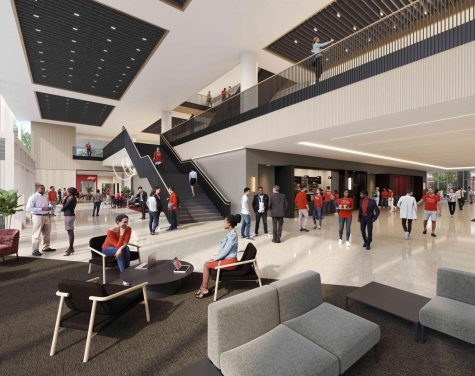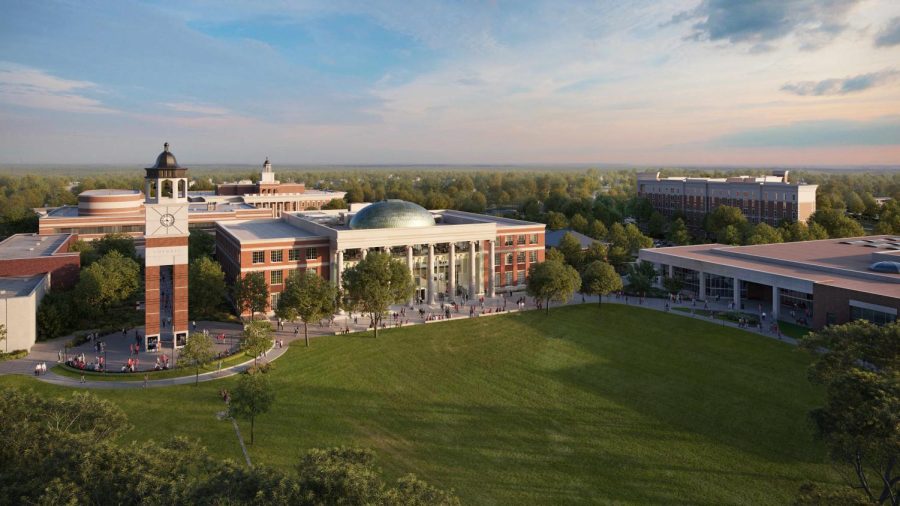WKU unveils new business college building at Board of Regents meeting
April 14, 2023
During the roughly two hour meeting, the Board of Regents unveiled the new business building, discussed refunding bonds and reviewed the university’s six year capital plan.
The meeting opened on a somber note with Regent Chair Philip Bale asking attendees to observe a 30 second moment of silence to think about “what is going on in the world,” referring to the recent shooting in Louisville.
Western Kentucky University unveiled the new renderings for the new building that will house the Gordon Ford College of Business.
“Today is a remarkable day for Western Kentucky University as we unveil plans for the new home of the Gordon Ford College of Business,” WKU President Timothy Caboni said. “ I’m really pleased and thankful to the state legislature and the governor for making this possible for our campus.”
The building will be three stories featuring copious seating areas, sales labs, classrooms, a trading room, where students can apply finance learning to the stock market, and a coffee shop, according to Janette Scott, a senior associate with Gensler, who designed the new building. The building will be roughly 113,000 square feet.
The building will be topped with a copper dome that “highlights and compliments” Guthrie Bell Tower and the many cupolas around campus, Caboni said.
Caboni said they plan to celebrate the groundbreaking of this building on June 14. The entire building process will last two years ending with a ribbon cutting in the fall 2025.

GFCB Dean Christopher Shook said, as a first generation college graduate, he is “really grateful” to WKU, Gensler and the state, who provided the $74.4 million price tag.
“There was a little bit of disbelief at first,” Shook said. “Then as we started designing the building and Gisler started collecting all this information then it became really real. Then there was a growing sense of excitement…the students now are saying ‘why so late?’”
The new building, described by Caboni as an “Apple store with columns,” will provide students with a sense of belonging, Shook said, that Grise Hall did not have. Shook also said students admitted this year will likely be the first students to use the building which is something he points out when recruiting.
“It’s fun to see their eyes light up,” Shook said. “Have you ever had a building designed just for you?”
Shook and Caboni agree that this new building will increase enrollment as the building is a “nod to the old while looking to the future.”
“This facility will say to young people who are considering coming to WKU [that] this is a future-oriented business school that cares about applied learning and has created a facility that will support you during your time on the Hill.”
Scott said the new building along with providing the students a “borderless” space will use roughly 20% less in operational energy usage and a 35% decrease in water usage.
Caboni said he is overjoyed to finally unveil the new building and provide a “great place to conduct business.”
“In my opening press conference as president I got asked about this project and my comment was this ‘a great college of business deserves a great place to conduct business,’” Caboni said. “What we showed the Regents today and are sharing with the community is that we will have a space for the Gordon Ford College of Business that is extraordinary.”
“This has been a university priority for 20 years before I even arrived as president six years ago,” he added.
Grise Hall, which currently houses the GFCB, will be demolished in 2027 after a celebration commemorating its service to the campus, Caboni said, after the renovations in Cherry Hall are completed. He is unsure at this time what will go in the space.
“Grise has really outlived its useful life,” Caboni said. “I could say a lot of things about Grise Hall, but it’s going to serve at least one more purpose for us…We need a place for everyone who is in Cherry Hall today to relocate while we do that work.”
Caboni said the unveiling was not just of a building but rather an opportunity for growth both on campus and in the community.
“It will elevate our community, it will transform higher learning for our students and it will serve as a symbol for WKU for generations to come,” Caboni said.“It’s not just about a new building…it’s really about what this facility enables for our students and alumni.”
The Regents also discussed the option of refinancing the bonds taken out with the university renovated and constructed new buildings.
“We’ve been working with our financial adviser on refund opportunities and given that the Regents meet quarterly several months ago it seemed timely with the rapidly changing bond market environment…it seemed appropriate to bring this so we would be nimble and free to refund these bonds if the opportunities presented themselves,” Howarth said.
In Oct. 2013, WKU issued “General Receipt Bonds” that generated over $36 million. The money was then used to construct the Honors College and International Center. According to Susan Howarth, Executive Vice President for Strategy, Operations and Finance, HCIC currently has an outstanding principle of $23 million maturing in 2033.
In June 2012, the university issued bonds again generating $35.8 million which was used for renovations on Downing Student Union. Howarth said DSU has an outstanding principle of $19 million.
These two action items gave Howarth the flexibility to “move appropriately” given the volatility of the market, she said. In order to refund the bonds the university must see a minimum 5% “net value savings.”
“A month ago there was a possibility of doing that on several of our bond series,” Howarth said. “Unfortunately with the changing situation in the financial markets that is no longer possible.”
Regent Milliken took issue with the language of the resolution saying it seemed like a one-time authorization rather than a year-long approval.
“I’d be more comfortable if it was in the resolution,” Milliken said.
In the end, approval of action item three and four, both concerning refunding bonds, were postponed to the next Regents meeting scheduled for May 4.
Bryan Russell, Chief Facilities Officer, presented the Regents with the university’s “six year capital plan.”
“We are required as a university every two years to submit a…needs assessment of the university,” Russell said.
The list, broken up in two year increments, lists various renovation projects around campus in order of priority. At the top of the current ist is renovation of the Academic Complex followed by renovation of Potter College of Arts & Letters buildings.
Russell said this approval by the committee had no funds attached as it was merely a “needs assessment” of campus.
As discussed in the Board of Regents preview, six academic certificates, two graduate and four undergraduate certificates, were approved by the Academic Affairs Committee. The two program suspensions were also approved.
Similarly, Russell also presented the “Asset Preservation Pool” to the committee saying it was still in the early stages of planning but that its goal was to use state provided funds to renovate and modernize facilities across campus.
To access this preservation pool the university must match 15% “from funds provided by each comprehensive institution,” according to Russell that 15% will be roughly $5 million.
Finally, Jennifer Breiwa Smith provided the Regents with a legislative update. She discussed a few bills that might affect WKU including a bill that makes hazing that causes harm to be a class D felony and resolution 38 that, among other things, could introduce the possibility of a new public institution in Southeastern Kentucky.
Administration reporter Michael Crimmins can be reached at [email protected].
























